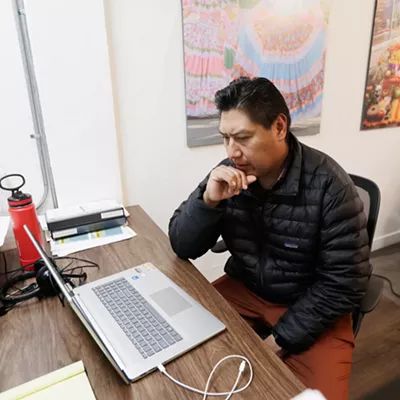When soldiers go off to war, there are parades, people hang yellow ribbons, attach stickers to their cars, call the soldiers heroes.
But on the back end, when soldiers return in need of continuing medical care or help getting a job, it can be a different story.
U.S. Senator Patty Murray heard those stories last week. Recently named chairwoman of the Senate Veterans’ Affairs Committee, Murray held the first in a series of national listening sessions at Spokane’s VFW Post 51, just north of downtown.
The cavernous meeting hall was packed with a standing-room crowd of veterans from all military branches who had served America in conflicts from World War II to Afghanistan. A thicket of hands shot up when it came time to speak.
“There were no surprises, but it reinforced what I do know: Someone who’s served their country should not have to come home and fight the VA,” says Murray, a longtime advocate for veterans.
Among the topics that emerged locally: DD Form 214:
• This is the official record of completed military service that is needed in order to apply for many veterans’ services from health care to burial in a military cemetery. It’s supposed to be presented upon discharge but many people at the VFW post told Murray of delays ranging as long as half a year.
Several offered suggestions about using different documents until the final paperwork is delivered.
• Military Sexual Trauma: One female veteran told Murray the military is taking a back-handed approach with those who report Military Sexual Trauma (rape, sexual assault, harassment). These soldiers, mostly women, are being quickly discharged with a finding of a general personality disorder, which leaves them unable to get help for the real issue.
It’s a growing problem. The VA says 48,000 female veterans reported Military Sexual Trauma in 2008.
“MST has not had enough focus and attention in our country,” Murray says. “Women — and men — suffer silently from it, and they are often misdiagnosed, not diagnosed or not listened to. And that, to me, is a tragedy.”
• Veterans’ Court: Murray seemed quite keen to hear about Spokane’s diversionary program run by volunteers.
“I am very, very fascinated by that,” she says. “I have talked to so many veterans who come home and struggle with so many issues: anger issues, trying to fit back in, drug and alcohol issues related to all that. They get in trouble and end up in a system that doesn’t recognize how they got there.
“Justice is not serving the veteran right. I think veterans’ court is a great idea,” Murray says.





















